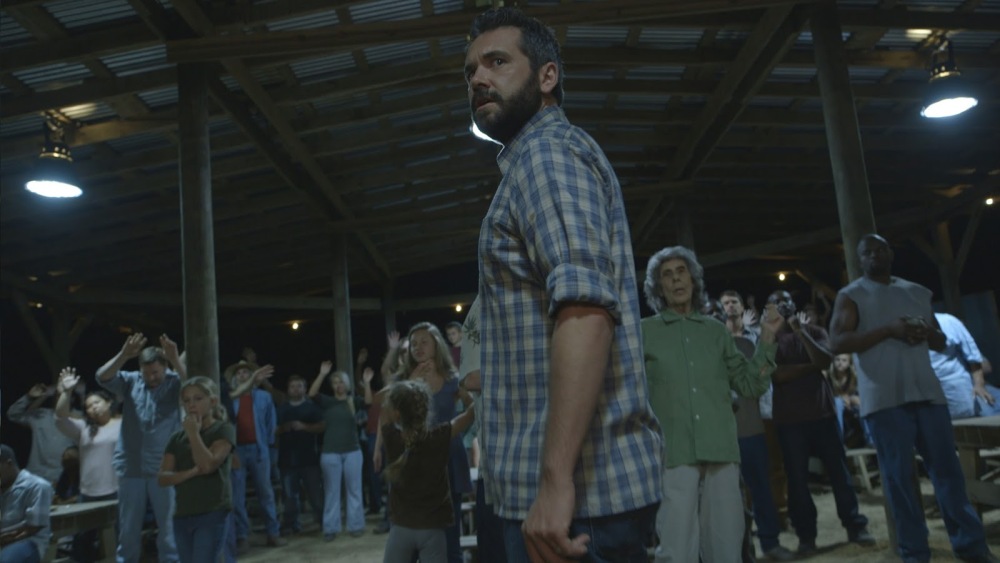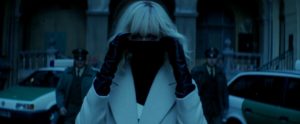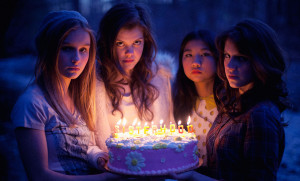
Interviewed at the Miami International Film Festival.
Most people don’t get the chance to interview some of their favorite directors the morning after watching their latest movie, but that’s exactly what happened with Ti West and I. After a late night of checking out his latest film The Sacrament — which is pretty damn great if you ask me — and listening to a small Q&A between him and New York Magazine & NPR’s David Edelstein, my morning led to an interview that featured lots of talk about West’s his latest film, his way of working, and how he’s developed his aesthetic.
Juan Barquin: So, to kick things off, The Sacrament is really damn bleak.
Ti West: Yes.
JB: Your films tend to have a lot of comic elements — like The Roost and Innkeepers especially — why is this one so grim?
TW: I was just sort of trying to switch it up, tone-wise, but also because the content that’s in this movie. And because, y’know, it’s very familiar, something that’s real. I wanted to make a movie that didn’t have supernatural elements and was supposed to be horrific. I felt like if it wasn’t bleak, sort of depressing and sort of confrontational, it would either be lame or exploitative; neither of which I wanted to do so I was trying to make a movie that hopefully really sold what it was like to see real horrific things.
JB: Yeah, it really did. I mean, just the way you build these characters. Father’s central scene, Caroline’s addictive personality — to drugs or clinging to Father — it all really builds into how you set the atmosphere and tension for a gut punch. With your last three films especially though, they take place in this sort of late 70s-early 80s atmosphere — do you mine that consciously or…
TW: Not really. I think it’s just my aesthetic and the taste that I have. I think that the odds of me making something with lots of modern technology — unless the movie’s all about that — I’m just not that interested in it. I don’t think it’s very cinematic. So, y’know, I think the stuff I focus on that’s just not as current, isn’t for some sort of retro reason but just because I find scenes on cell phones boring; I find scenes of people in front of computers boring.
JB: Even with The Innkeepers you have the modern tech but you don’t abuse it or make the work feel as tech-heavy as your usual modern horror film. I’m curious though — I read one of your older interviews and you said you didn’t want to get boxed into being a “genre director,” so what are you planning on doing outside of horror and thriller?
TW: Well, the next thing I’m doing is a western. I was either gonna do a western or a comedy; I was ready to write both and then the western got some traction so I’m gonna make that one. But yeah, I’m not gonna do a horror movie for a while. I’ll see what happens after the western.
JB: When and where are you gonna be making that one?
TW: Shooting in June in Sante Fe, New Mexico.
JB: And is it the same friend group [Joe Swanberg, AJ Bowen, Amy Seimetz, etc] and a higher budget?
TW: It’s not really a bigger budget, but y’know, I’ll be working with a lot of the same people. Cast-wise, I’m not entirely sure if there will be many crossovers from The Sacrament. I’d like there to be but the people are a lot older in the movie so I have to figure out if I can make that work.
JB: Cool, I’m pretty excited for that. Back to The Sacrament though, the whole situation seems really well-researched in terms of getting that Jonestown vibe down even though it’s smaller scale. Any reason you didn’t go any bigger or closer to the Jonestown size?
TW: Yeah, I mean if we had more money, there would have been more cabins and more people and whatnot. This is essentially what we could afford. But it doesn’t matter once you have enough people to make it seem like a lot. You know, obviously nine hundred people is a lot more immense than 100 people or whatever, but the reasons are the same y’know.
JB: And it still feels like a jarring number to be faced with — 160+ deaths. It gets to you at the end of this sort of mockumentary situation even though it kicked off a little jokey. On that note, last night you were saying you didn’t like to call it found-footage, and it definitely doesn’t feel like one.
TW: People call it that because when people go to see it, they think and expect the camera to move around a lot. It’s its own character. In this case, the fact that the camera is rolling is something you’re aware of in the movie, but other than that it doesn’t really follow the found footage format.
JB: Yeah, one thing I was a big fan of, was that instead of just natural sound, you had Tyler Bates’ score in there (Killer Joe, Sym-Bionic Titan, Slither). Why choose mixing the score and natural sound over just ambient tones?
TW: I mean, I didn’t want it to ever be this found footage thing. It was always meant to be an after the fact made documentary, so I wanted the music. In addition to that, I wanted to really start the movie with music and titles and text on screen. Right from the get go, we were establishing that this wasn’t going to be a Paranormal Activity type thing. But also, y’know, I think that with what we were dealing with, and the impact of the themes and everything, it was valuable to have music. It didn’t need to seem like this kind of “oh we found this tape in the dirty and this was what was on it” thing, so it was always meant to be a polished documentary, just like most after the fact docs do.
JB: And it really adds to the menacing quality of a lot of the scenes.
TW: There’s still that element of like, y’know, even though I’m making something that’s really realistic, I still want there to be some element of cinema to it. If you make something with no music whatsoever, it really pushes that this is only an authentic, real thing, and I wanted people to know it was a movie.
JB: So a professional production basically. In addition to directing, you also edit your own films. That’s also really beneficial in setting the tone I’d imagine.
TW: Kinda. I mean, for me, writing, directing, and editing your own movies: that’s just filmmaking. You come up with an idea for something, and then you figure out how to stage it. Once you do that, you put it together from the way you planned. It’s all the same thing. I don’t particularly compartmentalize those roles. I know some people do, but if you technically know how to edit a movie — not to say it wouldn’t be helpful to have someone else sometimes — sitting behind someone else who’s doing it when I could just do it myself would be hard. It’s tough to communicate to someone when it’s just like, “Hit two frames to the left.” Just get out of the way. But I also think that they always say “editing is the last rewrite” and that’s true. It’s all a part of figuring out the movie and finding it.
JB: So would you ever let anyone else take the reigns for you?
TW: No, I mean, unless I do a really big movie where it just won’t be allowed essentially; that’s just fine. If it’s my own thing and I met somebody that showed me a cut movie that was basically perfect a couple weeks after shooting, that’d be great. My life would be much less stressful, but until then I’ll just keep doing it myself.
JB: I know my best friend and I always like to sit down and edit things on our own, so it makes sense. One of the things I thought was really cool was the way the location was laid out. In that helicopter shot towards the end, everything seemed well-placed; how much thought and work went into the layout?
TW: I mean, a lot, definitely. We found the place to shoot, we built everything in Savannah, so it was like we found a place that worked for it. We could hide all our trucks and everything, then figure out what we could afford to build. So we could build the main house, the office, the medical center, the pavilion, and then I think we built ten cabins maybe — at the end there’s a couple of in-the-distance CG ones. But y’know, we were just trying to figure out how many places there would be, how many people we could put in a place like that, and how many extras we could. It’s very logistics-oriented, but there was this big map on the wall of where everything was gonna go, so it was funny to see it starting as an empty field that would become what you see. And ultimately after that it was all torn down.
JB: I usually hate asking something like this, but it’s kind of inspiring and refreshing seeing this group of friends going out and making movies even though you’re all over the place. It makes you think, “Well, these people are doing it to great effect, maybe we can do.” So I mean, is there any kind of advice you’d give about that?
TW: No, I mean, it’s essentially just: go out and do it. I think the thing is that most people don’t actually do that, so just go do it. If people you know are also just going and doing it, they can help you and you help them. If you do that long enough, that’s all that really happened to us. We just kept on. Every year was supposed to be the one where we all got offered 100 million dollar movies, and then we just made another different movie. And then next year it was like — 100 million dollars? Nope — so another movie. For me, it was just like, “Well after this one I’m gonna make a western.” I think you just kind of keep moving forward until you make something happen.
JB: Did anything ever happen with The Side Effect?
TW: We just couldn’t get enough money. We needed like $4 million and we had like $3.25 [million]. And because it’s a sci-fi movie — y’know, with The Sacrament, if you’re a little short on money, you can always find a way to figure it out — but a movie that takes place in a spaceships, you need to build them. The Sacrament was expensive to build, but it’s wood. Once you get into space, it’s a lot of material and it’s like everyone has to be in jumpsuits and everyone needs weird embroidered patches. If you don’t have it and it’s not good, it’s not worth doing. So we tried, and maybe it’ll happen again some other time, but y’know, we made this movie [The Sacrament] instead, so that’s fine.
JB: And you got a damn good movie. I actually saw the last film of yours I hadn’t seen last night as well, Trigger Man. And I just love the way that you build tension with just silence and not a lot happening. You don’t go for the jump scares, you go for the tension and atmosphere. Has that always been how you feel a horror film should be?
TW: No. I mean, I don’t see very many horror movies. I’m just not that interested in them and I think they’re like the same movie over and over again. I don’t know, maybe that’s not true. But to me it’s just like, there’s the stuff that’s happening and then what the movie is about. And a lot of horror movies that come out now, like mainstream horror movies, the movie’s never about anything; it’s just the stuff in the middle. It’s like everything in the movie is like: it’d be cool to do this or it facilities the next cool scene. And there’s nothing wrong with that, it’s just boring to me. It’s just like the movies are all technical and I’m not interested in that, so I don’t know. It’s not like I think it should be something else, that’s just what I’m interested in. I think that growing up, movies were more like that compared to now.
JB: So, last question then, what movies from a past period growing up influenced your aesthetic the most, if any?
TW: I mean, horror movies, not so much. Really filmmaker-driven movies like The Shining, The Exorcist, The Changeling were the ones I think were all very good movies and were unique to those filmmakers. Outside of that, Evil Dead and Bad Taste were the two movies that helped me figure out how to make movies. Like Bad Taste is the one that I was like, “Oh, that’s just a camera on a car.” I mean, that’s the one that’s most influential for me, as far as just taking a camera and figuring it out because it was the first time I saw a movie and I could see how he was doing it, so I was gonna try it.



 Derek
Derek
 Isabelle
Isabelle